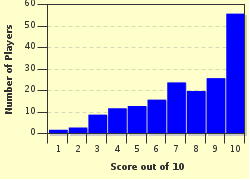Quiz Answer Key and Fun Facts
1. One day in streets of Rome 50 AD, two legionaries are talking to each other.
Gaius: "Ave, Julius, do you know where your centuria is heading to?"
Julius: "It's that place in Germania Inferior, the one called Oppidum Ubiorum until lately. I can't remember the new name."
Gaius: "Come on, it's easy. It's named after our Empress, who was born out there."
2. In the year 455 AD.
"Looks like these Franks are capturing us, looks like Rome being consigned to history for us now".
"Do you think so? It wouldn't be the first time, and do you remember the stories about the Attila and the Huns? But we were always saved in the long run."
What happened this time?
3. In the year 795 A.D. a peddler talks to a monk.
Peddler: "So they've made him an archbishop. Is that really true?"
Monk, proudly: "Oh yes, it has been confirmed. Hildebald is the first one to hold this honorable post. Isn't it wonderful!"
Peddler, grinning: "It is always good to know the right people."
Who was Hildebald's (or Hildebold) famous friend?
4. In the year 1164 A.D., late July in a butchery:
Customers: "Come on, look at your cutlets: they are more bones than meat. Wrap some golden cloth around them and sell them as relics!"
Butcher: "You are joking! That's my best meat! And talking about relics, did you hear what King Frederick gave to our archbishop?"
5. In 1288 A.D. near Cologne - at Worringen (sometimes spelled Woeringen), to be precise.
Stranger: "Good man, You do have a lot of military around here. What is happening?"
Local: "You are really not from here! These are the troops of Archbishop of Cologne, Siegfried II of Westerburg, and John I, Duke of Brabant. The town of Cologne is on his side, by the way. It's about the inheritance of the Duchy of Limburg."
Brabant won.
The battle - one of many in those violent centuries - was mainly of importance for John of Brabant, who got the Duchy of Limburg. But it was also important for Cologne's future history. Why?
6. In the year 1648 A.D.
Owner of an inn to a newly arrived student: "So tell me young man, I heard the war is over now?"
"Oh yes, they signed a peace treaty now. That's good news, isn't it?"
So the Thirty Years' War was over. Compared with towns like Magdeburg, did Cologne suffer badly?
7. In the year 1794 A.D.
In Cologne, near the "Hahnentor", one of the town gates.
"Oh look, there they are coming".
"At least everything went peacefully".
"Let's hope they do some cleaning up here".
They came with 12,000 soldiers through the "Hahnentor" and stayed from 1794 till 1814. Which powerful neighbor occupied Cologne?
8. In the year 1880 - a reporter in Cologne to his colleague:
"Have you heard? The Emperor is coming!"
"When?"
"Well, to the great celebration, October 15. Completed at last!"
What was completed?
9. It is November 1918. World War I is over.
People talking on the street: "Have the British arrived yet?"
"Yes, they have."
"Have they met the Lord Mayor yet?"
Who was the Lord Mayor? He was born in 1876 and was Lord Mayor from 1917-1933, when he lost his job. He was again Lord Mayor for a few months in 1945. In 1949 this old man became the first Chancellor of West Germany. And he did this until 1963!
10. March 6, 1945 - in a ruined house in Cologne.
Patriotic Youth: "Good news, good news! Pioneers blew up the Hohenzollern-Bridge. That will stop the Americans".
Adult: "Oh, really?"
When did the US Army reach Cologne?
Source: Author
heidi66
This quiz was reviewed by FunTrivia editor
bloomsby before going online.
Any errors found in FunTrivia content are routinely corrected through our feedback system.

